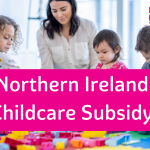Coronavirus: Advice on support for childcare
At Employers For Childcare, we understand that this is an uncertain time for parents, childcare providers and employers in relation to the impact of Coronavirus.
As consideration is given in the UK to closing schools and childcare settings, this has reinforced just how vital our childcare infrastructure is. We are calling on the Government to ensure that financial support is guaranteed to support parents, employers and childcare providers at this time. This is essential to mitigate the severe impact the temporary closure of childcare settings will have on families and the economy both now and when social isolation measures are no longer required, and the risk of collapse to our vital childcare sector.
In the meantime, we have set out below the answers to some Frequently Asked Questions from parents. This is a fluid situation which we will continue to monitor, taking on board guidance from the government and health officials and we will provide updates as necessary. Please contact our Family Benefits Advice Service if you would like guidance on:
- Benefits entitlements should you become ill, be required to self-isolate or are experiencing a decrease in your household income
- How employers can support their staff, for example, offering annual leave, unpaid leave or working from home arrangements should employees be unable to come to work.
You can contact the team Monday to Friday 8am to 5pm on 028 9267 8200.
For clients of Employers For Childcare’s Childcare Voucher service, we are taking direction from government and health officials, and have contingency plans in place to minimise any impact on our services. We would like to provide reassurance to parents, employers and childcare providers that we have measures in place to ensure that Childcare Vouchers will continue to be processed during this time.
Frequently Asked Questions
- If childcare settings close, will childcare providers still be paid?
At present, schools and childcare settings in the UK, including Northern Ireland, have not been required to close. If this changes, it is a matter for parents to talk to providers about whether they must continue to pay fees. This may be covered in any contract you have in place with your provider. For example, a contract may state that no refunds will be given should the provider forced to close for reasons beyond its control.
Some childcare providers may refund fees, or not require payment, if these issues are covered by their insurance or if they receive funds from the government in these exceptional circumstances.
We are calling on the government to ensure that childcare providers who are impacted by the closure of settings receive financial support to mitigate the impact on them and their staff otherwise there is a risk that this vital sector will face collapse.
- If my child is ill at home, or if we are required to self-isolate, will I still have to pay my childcare provider?
Again, you should check your contract with your childcare provider, however it is likely that you will be required to pay your childcare provider should your child be unable to attend due to illness or self-isolation. This is because the service is still being provided, although you are not availing of it.
You will still be able to get help with the cost of childcare through your normal method, for example, Tax Credits, Childcare Vouchers, Universal Credit or Tax-Free Childcare. It is important to note that eligibility criteria apply for many forms of support, and the form of support that is best for your family may change if your circumstances have changed. Call our Family Benefits Advice Service for more information.
- If schools and childcare providers close, am I entitled to time off work to look after my children or to be allowed to work from home?
This is something that will need to be discussed with employers on a case by case basis, and will depend on the terms and conditions of your contract of employment, so consult that, or your staff handbook in the first instance. We would encourage employers to take a flexible approach with employees, where they can. Homeworking may be an option, if it works for you and your organisation – alternatively employees may be able to benefit from dependants leave, annual leave or unpaid leave.
Your employer may pay you for time off to look after dependants but they don’t have to. Check your contract, company handbook or intranet site to see if there are rules about this, or speak to your HR Department or Line Manager to discuss with support may be available.
- If I am not paid during my time off can I get help from elsewhere?
You may be entitled to help through the benefits system if your household income reduces. Call our Freephone advice line on 0800 028 3008 for a personalised benefits calculation.
- Will I be entitled to pay if I am ill or am required to self-isolate for a period of time?
Your rights to Statutory Sick Pay (SSP) depend on your employment status and earnings.
If you’re an employee and earn at least £118 a week, you will be able to get £94.25 per week for up to 28 weeks. Normally you must be off for at least four days in a row, but the government has announced SSP will be paid from the first day you are off sick if it is related to coronavirus.
Some employers have more generous contractual sick pay schemes. It is worth checking your contract, staff handbook or with your employer.
If you’re not eligible for SSP, you might be able to claim Employment and Support Allowance (ESA) if you’re ill, or elements of Universal Credit if you need help with costs like children or housing.
- I am in receipt of benefits – if I need to self-isolate will my benefits stop due to missed appointments?
If you are self-isolating or have been diagnosed with COVID-19 and cannot attend an appointment at your Jobs and Benefits office you need to let them know by ringing your local Jobs and Benefits office. This should prevent any disruption to your claim.
The Department for Communities and Department for Work and Pensions have confirmed that people in self-isolation will continue to receive benefits.
Anyone self-isolating who is self-employed, or who works on a short term contract, can apply for Universal Credit or new style Contributory Employment and Support Allowance during the period of self-isolation
In Northern Ireland, anyone who is in a crisis situation can apply for financial help by contacting the Department for Communities Finance Support service on 0800 587 2750 (Freephone) or 0800 587 2751 (textphone for customers with hearing difficulties). If claiming Universal Credit they can also apply for a Universal Credit Contingency Fund grant by contacting the Finance Support service and choosing option 2.






